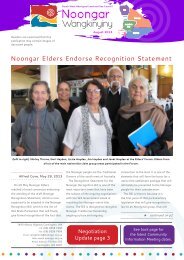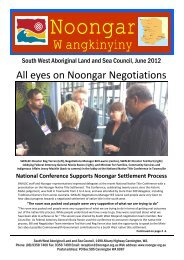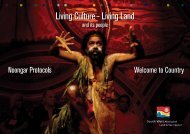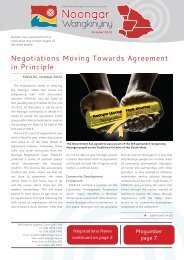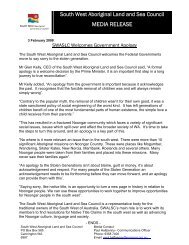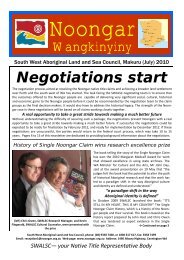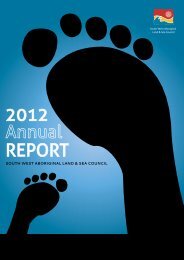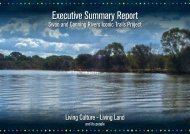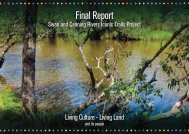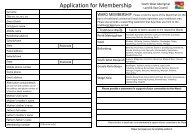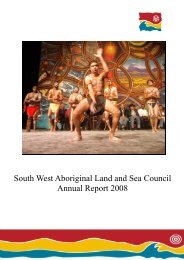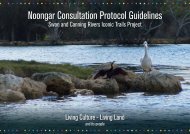View here. - South West Aboriginal Land & Sea Council
View here. - South West Aboriginal Land & Sea Council
View here. - South West Aboriginal Land & Sea Council
You also want an ePaper? Increase the reach of your titles
YUMPU automatically turns print PDFs into web optimized ePapers that Google loves.
Noongar Native Title Negotiationswith the WA State GovernmentFrequently Asked Questions1. Will I get any of the settlement money?Because a native title settlement is about the Noongar nation, the money from a settlement is forthe support of all Noongar people and to cover the ongoing costs of programs and assets that comeout of a settlement. This will all need to be self‐funding, so monies will go into an investment fundthat will become the core communal financial resource for all Noongars (Noongar Future Fund). Theannual interest earned from the Future Fund over the first ten years will be ploughed back into thefund so it grows into a more substantial fund. The underlying principle is that the settlement moneyis a communal resource (a Noongar commonwealth) that should be continually grown and availablefor all current and future generations of Noongars. The operations of the six new Regional NoongarCorporations will be funded for the first ten years by separate government funding. After that time,the funding for their operational programs will come from the interest earned by the Future Fund.If the settlement money was simply divided up between individual Noongars, it would be quicklyspent, and would be of no lasting value to future Noongar generations. So, while t<strong>here</strong> will be nopayments to individuals, t<strong>here</strong> will be substantial Community Development Programs provided byregional Noongar corporations, as well as lands and assets that will be used to advance Noongar cultural,social and economic goals.2. What type of Community Development Programs might beoffered?Each corporation will decide what programs are needed in their region. It’s expected that programswill have to be capable of making a real difference to Noongars and a significant contribution to nation‐buildingbefore they will be adopted. These might include educational scholarships (for school,TAFE, apprenticeship, university, and job training and re‐skilling, school attendance and meal support);cultural strengthening and language development; healing programs; business and employmententerprise support; an advocacy service providing better access for Noongars to governmentand non‐government health, housing, social and other services; justice diversion, suicide preventionand youth engagement; and hardship support.3. Will I get a house?No, a native title settlement doesn’t buy houses for people. You will be able to use the advocacysupport service that may help you get better access to public housing, access financial advice thatmight help you get a mortgage to buy a home, or take advantage of the opportunities that will arisein order to secure yourself a home.4. Will I get land?The negotiation process has identified over 2,000 parcels of land that SWALSC wants transferred aspart of the settlement. While the intention is that these parcels will become part of the Noongarcommonwealth as the Noongar <strong>Land</strong> Estate, it is possible that some parcels may be sold or used fordevelopments that would be of benefit to Noongar people. For example, it’s conceivable that someland could be sold to fund developments such as Noongar retirement homes, or be developed tosupport Noongar housing. In addition, many of these parcels of land are designed to preserve importantplaces, give Noongars cultural opportunities, and return significant amounts of country to Noongarpeople.
5. Will I get a car?No, a native title settlement will not result in people being given free cars.6. Will I get a job?A good settlement is expected to lead to more employment opportunities for Noongars. The establishmentof six regional Noongar corporations will each need to employ a small team to operate the communitydevelopment programs, and most of these jobs will go to Noongars. However, real growth inNoongar employment is more likely to come through the efforts of the advocacy support unit in eachregion negotiating employment agreements associated with industrial and commercial developmentsin that region, through improved educational outcomes from scholarship support, and through jointmanagement agreements and land management initiatives that require the employment of Noongarrangers.7. Will I be able to get hardship help?Each regional Noongar corporation is expected to provide a range of community development programsthat would specifically include means‐tested hardship help, especially for the elderly. These programsmight include help with things like food parcels, urgent housing repairs, or funeral costs.8. What will I get?The settlement is designed to secure rights, interests, and recognition today, and to set up a better futurefor Noongars. The main components of the settlement are:(1) Formal recognition of Noongars (by Act of Parliament) as traditional owners of the south west;(2) Customary rights to access Country for hunting, fishing and cultural reasons;(3) A significant contribution of lands for the Noongar <strong>Land</strong> Estate;(4) A significant contribution of funds to the Noongar Future Fund, for all future generations;(5) Contribution of funds for governance and operations of the Noongar Corporations for ten years;(6) Joint management of conservation estate (national parks) including access to Crown land andnatural resources for traditional purposes.The first direct benefit all Noongars will get from the settlement is the long overdue recognition andrespect as the acknowledged traditional owners of south west of WA. The second benefit will be equitableand transparent access to all the community development programs provided by the new NoongarRegional Corporations, including strengthening culture and language, support for wealth creationopportunities through education, employment, business, and land development, and improved healthand welfare. A good settlement will give the Noongar nation a level of self‐determination they have notenjoyed since before the colonisers “assumed” sovereignty over Noongar country on 11 June 1829.9. What will my family get?Families with children will benefit from the settlement as they will be able to access a range of supportservices designed to improve the educational outcomes and employment prospects of Noongar kids.The long term aim is to see a lot more young Noongars moving up into professional positions such asteachers, lawyers, doctors, and business leaders (w<strong>here</strong> they can put something back and contribute tothe nation building of the Noongar community). This is in addition to support for traditionally popularNoongar career paths such as the trades, public service, and the mining sector. Education is particularlyimportant, and as the US human rights activist Malcolm X said: ”Education is the passport to the future,for tomorrow belongs to the people who prepare for it today”.10. Will I still get government help?Yes, all Noongars will still be able to access all the existing services provided by the State and Federalgovernments. The Noongar corporations will provide services that the Noongar community need, andthat are not provided by other agencies.
11. Will I get help to start a business?Yes. The Noongar corporations are expected to strongly support Noongar people wanting to start theirown businesses.12. Can we develop the land we get back?Yes, it’s possible that some of the parcels of land that are expected to be transferred to the Noongar<strong>Land</strong> Estate may be suitable for development. While this land will initially be a communal rather thanan individual asset, it is expected that some land will be available for sub‐lease to individuals and familieson beneficial terms.13. How can I become a Board member?All Noongars over the age of 18 and who are members will be eligible to stand for election to their respectiveregional Noongar corporation board (subject to all the normal requirements).14. What happens to Working Party members?The role of the Working Parties will be transferred to the regional Noongar corporations, and membersof the Working Parties will be eligible to stand for election to their respective regional Noongar corporation.15. Will t<strong>here</strong> be a youth council?Yes, the future of young Noongars will be a major focus of the settlement, and a Noongar Youth<strong>Council</strong> will be expected to play a key part in the nation‐building process.16. In 50 years, how will people know who the Traditional Ownersare?The formal recognition of the Noongars as the traditional owners of the south west of WA (by Act ofParliament), and 50 years of nation‐building that will follow are expected to result in renewed respectfor the cultural authority of the Noongars, which will re‐position us at the centre of <strong>West</strong> Australian culturalidentity.17. What happens to SWALSC and SWALSC staff?SWALSC will be transformed into the Central Noongar Corporation and will provide support services tothe Regional and Metro Noongar Corporations. The SWALSC staff profile will change, with less focus onnative title legal issues and more intense focus on community, cultural and economic development,land management and nation building.18. What happens to the cultural and language materials held bySWALSC?All the cultural, language and historical materials will remain with SWALSC as the central Noongar corporation.It is intended that materials be developed into cultural resources for Noongar people and theRegional Corporations.19. Will Kaartijin still be funded and running?The funding supporting the Kaarrtijin project has been exhausted. SWALSC, as the central Noongar corporationwill be expected to seek funding for the continuation of the project.
20. Who will look after the money?The Noongar Future Fund will be administered by a board consisting of experienced business professionals,government and Noongar community representatives. The Regional Corporations will receiveongoing annual funding to run the programs, events and services that help their local community.21. Who will look after the land?The central Noongar Trust will hold Noongar <strong>Land</strong> Estate as a communal asset, but each regional corporationwill take responsibility for the management of Noongar land in their respective region.22. Why should Noongars support the negotiations?Because it has the potential to deliver much better and broader outcomes, more quickly than a courtbasednative title settlement.23. What are the 7 main reasons for supporting a negotiated outcome?A good settlement has the potential to deliver:1. Recognition of traditional ownership;2. A valuable land base;3. A better heritage regime;4. Joint management of protected areas;5. Rights of access to land for traditional purposes;6. A community development package addressing Noongar health, education, &welfare priorities;7. An ongoing revenue stream that supports these outcomes in a sustainable way forall future generations of Noongars.24. How long will the negotiations take to complete?The negotiations are expected to take at least until the end of 2012 before being ready for implementationin early 2013.25. Who will benefit from a successful negotiation?All Noongars will benefit. Unlike many other native title agreements, this agreement is based on theprinciple of equity and collective benefit for all Noongars.26. What happens if the negotiations fail?If the negotiations fail to deliver a good settlement, the parties would simply return to the FederalCourt process, which may take anything between up to 20 years to complete. But t<strong>here</strong> are no guaranteesabout the success or outcomes of the court process.27. Who gets to make the final decision?The members of each of the six claim groups will make the final decision on whether to accept or rejectany offer of settlement. This will happen at claim group authorisation meetings in late 2012 to which allNoongars will be welcomed. Anything that happens before this is a preliminary step.
28. What area is included in the south west Settlement?The outer boundary of the claim area runs from a point south of Dongara on the west coast, proceedingroughly east to a point north of Moora in the southern wheat belt and then south‐easterly to a pointmidway between Albany and Esperance.29. What is the south west Settlement proposal?The State Government has made an in‐principle offer to resolve all native title claims in the south west.The offer involves a set of benefits to the Noongar claimants collectively and has been accepted byNoongar representatives as the basis for further negotiations.30. What are the main benefits?The key features of the State's offer are:• Recognition of the Noongars as traditional owners of the south west before Parliament;• A central Investment Trust which will receive assets over a ten year period, ihcluding annual fundingand certain Crown land holdings;• Funding for a central and six regional Noongar corporation with a community development role;• Joint management of the State's Conservation Estate in the <strong>South</strong> <strong>West</strong>;31. What does the State receive in return?The offer is based on the surrender of all native title rights in the south west, removing all past and futurecompensation liabilities for the State, and agreement on an effective cultural heritage managementsystem.32. What can be achieved from the Settlement?Finalising the native title claims in the south west is the starting point for an investment in the future ofthe Noongar community. The agreement will provide sustainable support for ongoing Noongar communitydevelopment. It is envisaged that the agreement will:• build a stronger Noongar community;• promote greater public understanding of Noongar culture and society;• increase partnerships between the Noongar community and Government and non‐governmenthuman service deliverers, including education, health, child welfare, and training.33. Will individual Noongar people receive direct financial benefits?No. The proposed agreement is between the State Government and the Noongar people as a whole society,representing more than 30,000 people. No individual will receive direct benefits.34. Who is the State Government negotiating with?The State Government is negotiating with six principle native title claim groups in the south west. Thesegroups are:(1) Yued (Jurien, Moora, Lancelin, Gingin); (2) Gnaala Karla Boodja (Mandurah, Bunbury, Donnybrook);(3) <strong>South</strong> <strong>West</strong> Boojarah (Busselton, Dunsborough, Margaret River, Pemberton, Nannup); (4) WagylKaip (Katanning, Gnowangerup, Albany); (5) Ballardong (York, Northam, Hyden, Kondinin); and (6)Whadjuk (Perth Metropolitan area).These claims are represented by the <strong>South</strong> <strong>West</strong> <strong>Aboriginal</strong> <strong>Land</strong> and <strong>Sea</strong> <strong>Council</strong> (SWALSC). T<strong>here</strong> hasbeen extensive research on the ancestry of the six groups to ensure they are the appropriate people tospeak for different parts of the <strong>South</strong> <strong>West</strong>.
35. Are native title rights likely to be found in the south west?A Federal Court could find that native title rights exist over some parts of the south west but grants ofland title since 1829 have extinguished native title in much of the region and European settlement hada big impact on Noongar tradition.36. Why haven't the native title claims already been settled by theCourts?Federal Court native title processes are time consuming and costly and can be inconclusive. T<strong>here</strong> isalso a considerable social cost. In 2009, the State Government and the Noongar native title claimantsopted to work collaboratively towards a negotiated outcome.37. Are all <strong>Aboriginal</strong> people in the south west involved?The <strong>Aboriginal</strong> population of the south west is not solely made up of Noongar people but only Noongarpeople are able to make native title claims in that region. The Noongar people are those who the Governmentis required at law to negotiate with over asserted native title rights. Some Noongar people donot participate in the business of the claims but remain eligible to do so.38. Are t<strong>here</strong> Noongar people who disagree with the negotiations?SWALSC is accredited under the Native Title Act 1993 to represent native title claims in this region andthe entire process is being conducted under the scrutiny of the Federal Court and the National NativeTitle Tribunal. If t<strong>here</strong> is dissent with an agreement, the Federal Court and the Tribunal are the appropriatearbiters.The State is confident that the process is being conducted with integrity and that everyone who has aright to be consulted will be consulted.39. Is t<strong>here</strong> likely to be division within the Indigenous communitylike the current experience in Broome?T<strong>here</strong> has been unity among the Noongar claim groups for the last three years but as we get closer toan outcome t<strong>here</strong> is inevitably scope for some dispute within the Noongar community.The Native Title Act 1993 (Commonwealth) sets our very particular terms for <strong>Aboriginal</strong> parties to objectto a native title agreement. It also has strict terms for arbitration. Any objection to the agreementsfrom within the <strong>Aboriginal</strong> community would be settled before the National Native Title Tribunal or beforethe Federal Court. The State and SWALSC have done lengthy research on who has a right, based onancestry, to be involved in the claims. In addition the National Native Title Tribunal will oversee a furtherdue diligence program in the next few months to ensure all the right <strong>Aboriginal</strong> people have theopportunity to comment.40. Does the Government's offer impact on private land holders?No. T<strong>here</strong> is no impact on private land holders. No land or property held by third parties is under anyrisk from the proposed agreement.41. Does the Settlement proposal impact on local government?<strong>Land</strong> held by local government is not at risk. The local government sector has, over a long period, supporteda negotiated outcome in the south west.
42. Will the agreement impact on water or fishing rights?No. The proposed agreement has no impact on water rights or fishing rights. The Settlement will beconsistent with current laws and regulations for water and fishing. No offshore or marine areas are involved.43. How much will the Settlement cost taxpayers?This is still subject to negotiations. The final agreement will cost 100s of millions of dollars over tenyears. Funds will be drawn from consolidated revenue, most likely commencing in 2013‐14.The State will make a financial contribution to the administration of six regional Noongar councils.44. Will the costs be akin funding for local governments?The regional Noongar councils are not akin to local government bodies and the financial commitment ismuch more modest. Their role is also much more limited.45. How much land will the Noongars get through the Settlement?This is still subject to review, within Government. The transfer of any Crown land is subject to all standardcompliance tests (e.g. mineral exploration, environment, planning, etc) and cannot compete withother State interests or private interests.46. How much money will the Noongars get through the Settlement?How will this funding be distributed?The final amount is still under negotiation.All funding will go into an investment trust with an independent trustee and a set of trust objectivesapproved by the State. The capital in the investment fund cannot be drawn down on for distribution.After ten years the Trust can distribute earnings via the Noongar councils for community developmentpurposes. The guidelines for community development will be subject to government approval. TheNoongars have strongly supported very conservative management of the investment trust.47. Is the contract of agreement binding across future stategovernments?All existing native title agreements in WA have been honoured by successive governments. A futurestate government is highly unlikely to breach good faith or expose the government to litigation.48. Has the Commonwealth had any involvement in the negotiationsto date, even in an observer capacity?The Commonwealth is a legal respondent to the claims before the Federal Court and has supported thenegotiations but is not an active party to the negotiations. The Commonwealth Attorney‐ General's Department,the Department of Families, Housing, Community Services and Indigenous Affairs (FaHCSIA),the Indigenous <strong>Land</strong> Corporation and Indigenous Business Australia have been briefed at different timesin the last 18 months.
49. What is the Commonwealth's contribution? Will the Settlementbe jeopardised if the Commonwealth does not contribute to theSettlement?The State Government will invite the Commonwealth to become a party. The State's offer is not conditionalon Commonwealth funding.50. Is private sector funding likely to be included?Not in the initial agreement but it is very likely that over time commercial funding will be involved.51. Will this Settlement improve the condition of <strong>Aboriginal</strong> <strong>West</strong>Australians?The Settlement is a long‐term investment that will benefit both Noongar people and the wider <strong>West</strong>ernAustralian community. The State is also investing in the Noongar leadership and their dedication to thefuture of their own community.52. When does the Premier anticipate raising the agreement withthe Prime Minister to seek her support?Communication with the Commonwealth about their input to native title agreements is ongoing.53. What is the status of crown lands which are currently leased i.e.pastoral/farming leases? Can they be transferred?No Crown land with a lease to a third party is included in the transfer process. Pastoral/farming propertiesare excluded.54. If land held by the Trust was sold for resource operations wouldroyalties still go to the state?It would be treated the same as any other landholder's land. The State owns all mineral rights.55. Will the Noongar Interpretive Centre have separate funding?It will be part of the final agreement but has not been costed as yet. A budget will be put before theState Cabinet as part of a final agreement.56. Are t<strong>here</strong> other agreements currently under development inother parts of the state?The Government has multiple proposals on offer to settle individual native title claims across WA butthey are much more modest. The south west Settlement is unique in that it covers a full region of theState, involves multiple claims and has wider social impact. The <strong>Aboriginal</strong> community involved is alsothe largest in the State.



